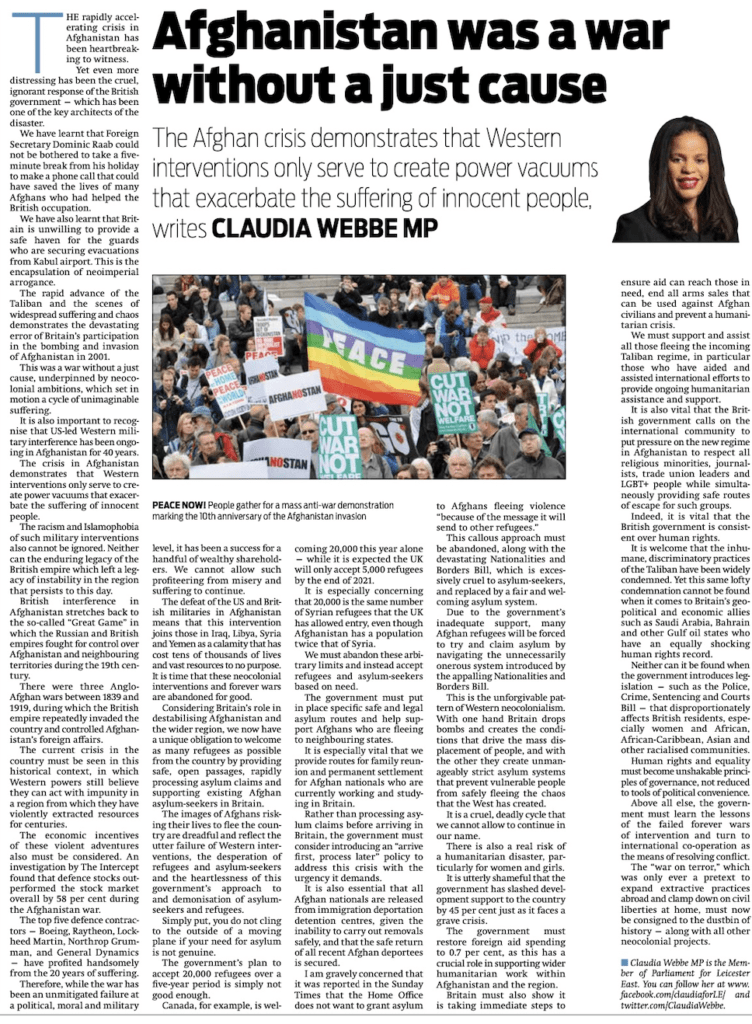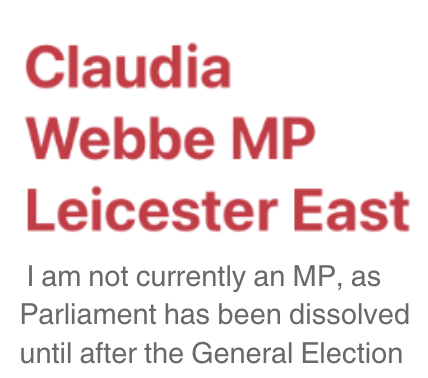
Afghanistan was a war without a just cause
By Claudia Webbe MP
The Afghan crisis demonstrates that Western interventions only serve to create power vacuums that exacerbate the suffering of innocent people, writes CLAUDIA WEBBE MP
The rapidly accelerating crisis in Afghanistan has been heartbreaking to witness.
Yet even more distressing has been the cruel, ignorant response of the British government — which has been one of the key architects of the disaster.
We have learnt that Foreign Secretary Dominic Raab could not be bothered to take a five-minute break from his holiday to make a phone call that could have saved the lives of many Afghans who had helped the British occupation.
We have also learnt that Britain is unwilling to provide a safe haven for the guards who are securing evacuations from Kabul airport. This is the encapsulation of neoimperial arrogance.
The rapid advance of the Taliban and the scenes of widespread suffering and chaos demonstrates the devastating error of Britain’s participation in the bombing and invasion of Afghanistan in 2001.
This was a war without a just cause, underpinned by neocolonial ambitions, which set in motion a cycle of unimaginable suffering.
It is also important to recognise that US-led Western military interference has been ongoing in Afghanistan for 40 years.
The crisis in Afghanistan demonstrates that Western interventions only serve to create power vacuums that exacerbate the suffering of innocent people.
The racism and Islamophobia of such military interventions also cannot be ignored. Neither can the enduring legacy of the British empire which left a legacy of instability in the region that persists to this day.
British interference in Afghanistan stretches back to the so-called “Great Game” in which the Russian and British empires fought for control over Afghanistan and neighbouring territories during the 19th century.
There were three Anglo-Afghan wars between 1839 and 1919, during which the British empire repeatedly invaded the country and controlled Afghanistan’s foreign affairs.
The current crisis in the country must be seen in this historical context, in which Western powers still believe they can act with impunity in a region from which they have violently extracted resources for centuries.
The economic incentives of these violent adventures also must be considered. An investigation by The Intercept found that defence stocks outperformed the stock market overall by 58 per cent during the Afghanistan war.
The top five defence contractors — Boeing, Raytheon, Lockheed Martin, Northrop Grumman, and General Dynamics — have profited handsomely from the 20 years of suffering.
Therefore, while the war has been an unmitigated failure at a political, moral and military level, it has been a success for a handful of wealthy shareholders. We cannot allow such profiteering from misery and suffering to continue.
The defeat of the US and British militaries in Afghanistan means that this intervention joins those in Iraq, Libya, Syria and Yemen as a calamity that has cost tens of thousands of lives and vast resources to no purpose. It is time that these neocolonial interventions and forever wars are abandoned for good.
Considering Britain’s role in destabilising Afghanistan and the wider region, we now have a unique obligation to welcome as many refugees as possible from the country by providing safe, open passages, rapidly processing asylum claims and supporting existing Afghan asylum-seekers in Britain.
The images of Afghans risking their lives to flee the country are dreadful and reflect the utter failure of Western interventions, the desperation of refugees and asylum-seekers and the heartlessness of this government’s approach to and demonisation of asylum-seekers and refugees.
Simply put, you do not cling to the outside of a moving plane if your need for asylum is not genuine.
The government’s plan to accept 20,000 refugees over a five-year period is simply not good enough.
Canada, for example, is welcoming 20,000 this year alone — while it is expected the UK will only accept 5,000 refugees by the end of 2021.
It is especially concerning that 20,000 is the same number of Syrian refugees that the UK has allowed entry, even though Afghanistan has a population twice that of Syria.
We must abandon these arbitrary limits and instead accept refugees and asylum-seekers based on need.
The government must put in place specific safe and legal asylum routes and help support Afghans who are fleeing to neighbouring states.
It is especially vital that we provide routes for family reunion and permanent settlement for Afghan nationals who are currently working and studying in Britain.
Rather than processing asylum claims before arriving in Britain, the government must consider introducing an “arrive first, process later” policy to address this crisis with the urgency it demands.
It is also essential that all Afghan nationals are released from immigration deportation detention centres, given the inability to carry out removals safely, and that the safe return of all recent Afghan deportees is secured.
I am gravely concerned that it was reported in the Sunday Times that the Home Office does not want to grant asylum to Afghans fleeing violence “because of the message it will send to other refugees.”
This callous approach must be abandoned, along with the devastating Nationalities and Borders Bill, which is excessively cruel to asylum-seekers, and replaced by a fair and welcoming asylum system.
Due to the government’s inadequate support, many Afghan refugees will be forced to try and claim asylum by navigating the unnecessarily onerous system introduced by the appalling Nationalities and Borders Bill.
This is the unforgivable pattern of Western neocolonialism. With one hand Britain drops bombs and creates the conditions that drive the mass displacement of people, and with the other they create unmanageably strict asylum systems that prevent vulnerable people from safely fleeing the chaos that the West has created.
It is a cruel, deadly cycle that we cannot allow to continue in our name.
There is also a real risk of a humanitarian disaster, particularly for women and girls.
It is utterly shameful that the government has slashed development support to the country by 45 per cent just as it faces a grave crisis.
The government must restore foreign aid spending to 0.7 per cent, as this has a crucial role in supporting wider humanitarian work within Afghanistan and the region.
Britain must also show it is taking immediate steps to ensure aid can reach those in need, end all arms sales that can be used against Afghan civilians and prevent a humanitarian crisis.
We must support and assist all those fleeing the incoming Taliban regime, in particular those who have aided and assisted international efforts to provide ongoing humanitarian assistance and support.
It is also vital that the British government calls on the international community to put pressure on the new regime in Afghanistan to respect all religious minorities, journalists, trade union leaders and LGBT+ people while simultaneously providing safe routes of escape for such groups.
Indeed, it is vital that the British government is consistent over human rights.
It is welcome that the inhumane, discriminatory practices of the Taliban have been widely condemned. Yet this same lofty condemnation cannot be found when it comes to Britain’s geopolitical and economic allies such as Saudi Arabia, Bahrain and other Gulf oil states who have an equally shocking human rights record.
Neither can it be found when the government introduces legislation — such as the Police, Crime, Sentencing and Courts Bill — that disproportionately affects British residents, especially women and African, African-Caribbean, Asian and other racialised communities.
Human rights and equality must become unshakable principles of governance, not reduced to tools of political convenience.
Above all else, the government must learn the lessons of the failed forever wars of intervention and turn to international co-operation as the means of resolving conflict.
The “war on terror,” which was only ever a pretext to expand extractive practices abroad and clamp down on civil liberties at home, must now be consigned to the dustbin of history — along with all other neocolonial projects.
Claudia Webbe MP is the member of Parliament for Leicester East. You can follow her at www.facebook.com/claudiaforLE and twitter.com/ClaudiaWebbe


